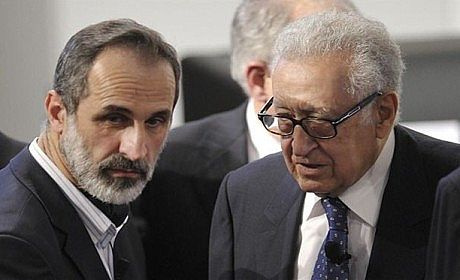West Accepting Iran in Syria

Two years have passed since the Syrian crisis began and domestic conflicts still continue in this country. During this time, there have been ups and downs in the domestic military disputes and foreign policy confrontations, especially within the last year; but it is evident that due to the fact that neither side has the necessary capability to gain complete victory, the crisis in Syria has been faced with a complex deadlock.
A. In the domestic military scene, the following developments are significant:
1. The use of heavy and semi-heavy weapons by both sides during the last year has seriously damaged and destructed the scene of clashes between the government and the armed opposition groups.
2. The presence of non-Syrian elements from different countries and with various citizenships and with ideological Salafi inclinations who are affiliated mainly to al-Qaeda in clashes with the government has grown. Among them and besides the presence of the citizens of some Arab countries, non-Arab individuals have also participated in this scene.
3. One other domestic development on the ground was the handover of Kurdish-populated areas in Syria by the existing government to one of the Kurdish political organizations entitled the Kurdish Democratic Union Party through a calculated plan. This Kurdish party, which is the biggest political organization of Syria’s Kurds, is close to the PKK and some believe that it is the Syrian branch of the PKK.
4. The other development is the political and military fallouts in Bashar Assad’s government last June and July. These fallouts took place within the framework of assassinations or the escape of some officials who were affiliated with the regime and dealt a heavy psychological blow to the regime; but they did not lead to change in the power structure or give signs of its collapse.
5. In the foreign operational scene, a very important and dangerous development occurred during the past year, the consequences of which covered Syria’s surroundings and even went beyond its neighboring countries, and that was the increase of ethnic differences and religious disputes, the impacts of which not only still remain but will also persist for years. This approach was pursued with the aim of regionalizing the war and spreading it to surrounding areas such as Lebanon and Iraq through the political and propagandistic behavior of some Arab countries and Israel. This approach was gradually transferred to other areas like Egypt, Yemen, and Kuwait.
B. In the political developments related to the crisis in Syria during the past year, the following points are more significant:
1. More solidarity between the divided opposition groups through the efforts made by and supported by Qatar, Saudi Arabia, Turkey, and the US. The opposition groups residing outside the country, which, due to their political differences and varied inclinations, did not enjoy necessary coordination to fight against the ruling regime since the beginning of the crisis, finally gathered last November in Doha with the direct intervention of the US and the threats of their financial supporters like Qatar. They formed a front called “National Coalition of Syrian Opposition”.
2. The political role and status of the Russians became more prominent during the last year and today Russia is considered as the determining foreign element in the international scene and in support of Bashar Assad’s government.
3. Among the other important developments in the Syrian scene during the last days of the year was the Syrian government’s acceptance to negotiate with the armed opposition groups. The government of Syria had never agreed to talk with the opposition deployed in Istanbul in the past. This approach means recognition of the armed opposition.
4. The status of the Islamic Republic of Iran was repaired and Iran’s political situation at the regional level and compared with the beginning of the crisis has improved. Due to our country’s unilateral support of the Syrian government, there was no chance for the Islamic Republic’s active participation to end the bloody clashes in Syria. Influential regional and international governments and also the armed opposition groups were not ready to accept Iran’s role. This trend continued until mid-2012 but the developments later changed their course.

